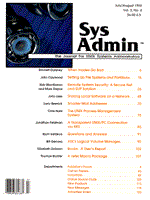
Publisher's Forum
UNIX is a far more complete, robust, and flexible operating system than any of the operating systems that have gained significant market share in the PC domain. Consequently, UNIX's traditional domains have been environments with different constraints, priorities, and user communities than those common to PC-based environments. Thus it is only reasonable that UNIX has been little influenced by technical standards dominant in the PC realm. Times are a-changing, though. UNIX as a workstation environment puts it in the hands of the personal user. UNIX's role as a common ground facilitating interoperability in heterogeneous environments makes it a natural choice as a server in environments with networked PCs. The user's increasing investment in PC tools and skills brings increased pressure to supply PC-like interfaces and applications. UNIX users and UNIX vendors can hardly afford to remain, as they once were, separate from and oblivious to the standards in the PC world. Administrators, in particular, have benefited from one PC influence: The MS-DOS disk format. Most UNIX implementations are now capable of reading an MS-DOS formatted floppy disk. At least for shops like ours, this capability is a welcome development. we aren't a big DP shop and have never had a 9-track tape drive. Like many smaller installations, we've instead used various cartridge tape systems fro backup and relied upon floppies for data exchange. Unfortunately, exchanging data via a UNIX-formatted floppy or cartridge tape is mostly a bad joke--there's just too little commonality among formats. The de facto MS-DOS standard helps for small files, but larger volume data exchange remains problematic. Relief may be just around the corner--again from our PC neighbors. A number of prominent backup vendors, many of whom serve both the PC and UNIX markets, are now developing support for the new System Independent Data Format (SIDF) standard. Originally proposed by Novell, this standard for tape and other media would facilitate the exchange of data between PCs, between PCs and UNIX boxes, and even between heterogeneous UNIX boxes. I think this standard has the potential to greatly simplify an administrator's life. Imagine being able to use your UNIX workstation to extract files from last month's backup of the local Novell server. Imagine having an IRS auditor request to see records that only exist on backups made two years ago on a now nonexistent machine. Wouldn't it be nice to be able to load the backup tape into any machine and extract the needed files? SIDF promises this kind of interoperability. Perhaps more important, SIDF appears to be capable of gaining the necessary vendor support and standardization (through an ISO initiative) to deliver on the promise. Thus, I encourage you to investigate this potential gift from the PC community. Ask your backup and storage vendors about SIDF support. Begin to consider physical media compatibility as an important purchasing criterion. Remember, sometimes technology does make life easier.
Robert Ward
|